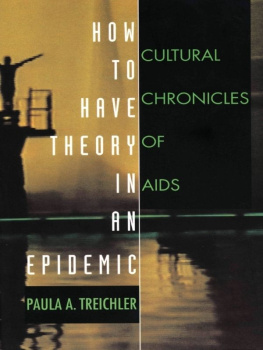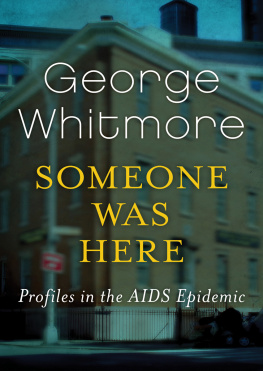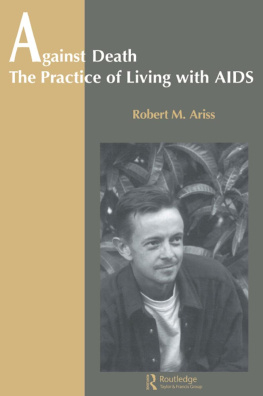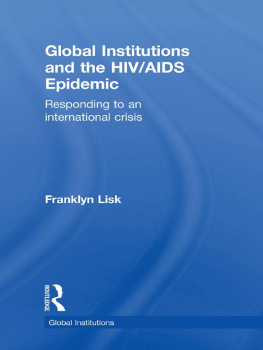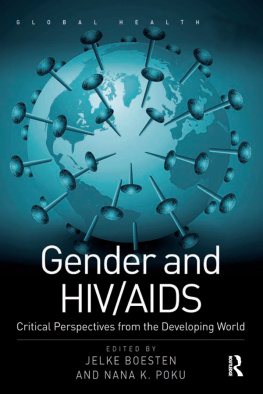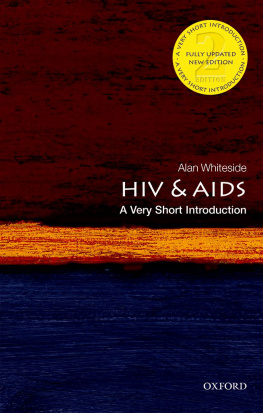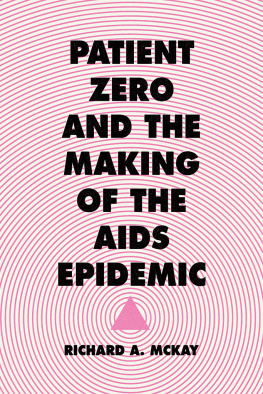Paula A. Treichler - How to Have Theory in an Epidemic: Cultural Chronicles of AIDS (Series Q)
Here you can read online Paula A. Treichler - How to Have Theory in an Epidemic: Cultural Chronicles of AIDS (Series Q) full text of the book (entire story) in english for free. Download pdf and epub, get meaning, cover and reviews about this ebook. year: 2012, publisher: Duke University Press, genre: Romance novel. Description of the work, (preface) as well as reviews are available. Best literature library LitArk.com created for fans of good reading and offers a wide selection of genres:
Romance novel
Science fiction
Adventure
Detective
Science
History
Home and family
Prose
Art
Politics
Computer
Non-fiction
Religion
Business
Children
Humor
Choose a favorite category and find really read worthwhile books. Enjoy immersion in the world of imagination, feel the emotions of the characters or learn something new for yourself, make an fascinating discovery.
- Book:How to Have Theory in an Epidemic: Cultural Chronicles of AIDS (Series Q)
- Author:
- Publisher:Duke University Press
- Genre:
- Year:2012
- Rating:3 / 5
- Favourites:Add to favourites
- Your mark:
- 60
- 1
- 2
- 3
- 4
- 5
How to Have Theory in an Epidemic: Cultural Chronicles of AIDS (Series Q): summary, description and annotation
We offer to read an annotation, description, summary or preface (depends on what the author of the book "How to Have Theory in an Epidemic: Cultural Chronicles of AIDS (Series Q)" wrote himself). If you haven't found the necessary information about the book — write in the comments, we will try to find it.
How to Have Theory in an Epidemic: Cultural Chronicles of AIDS (Series Q) — read online for free the complete book (whole text) full work
Below is the text of the book, divided by pages. System saving the place of the last page read, allows you to conveniently read the book "How to Have Theory in an Epidemic: Cultural Chronicles of AIDS (Series Q)" online for free, without having to search again every time where you left off. Put a bookmark, and you can go to the page where you finished reading at any time.
Font size:
Interval:
Bookmark:
DUKE UNIVERSITY PRESS Durham and London 1999
3rd printing, 2006
1999 Duke University Press
All rights reserved
Printed in the United States of America on acid-free paper
Typeset in Trump Mediaeval by Keystone Typesetting, Inc.
Library of Congress Cataloging-in-Publication Data appear
on the last printed page of this book.
For Cary,
the one and only
my one and only
Acknowledgment must first be made to those whom AIDS/HIV has infected or killed; like those who continue to fight the epidemic every day, their courage is amazing and their examples inspiring.
Research for this project has been supported in part by grants from the National Council of Teachers of English and the University of Illinois at Urbana-Champaign Graduate College Research Board. Throughout its evolution, this work has also been supported in countless ways, both intellectual and material, by the academic units at the University of Illinois to which I have the good fortune to belong: the College of Medicine at Urbana-Champaign, the Institute of Communications Research, the Womens Studies Program, and the Unit for Criticism and Interpretive Theory. I am grateful to other institutions for furnishing me, at crucial points in this project, with a room of my own: the Ragdale Foundation in Lake Forest, Illinois; the Society for the Humanities at Cornell University; and the Womens Studies Program at the University of California, Santa Barbara.
Within the vast network of people committed to ending the AIDS/HIV epidemic, the following people have especially helped and inspired me: Dennis Altman, Allan M. Brandt, Douglas Crimp, Lisa Duggan, Paul Farmer, Elizabeth Fee, Jan Zita Grover, Nan Hunter, Stephanie Kane, Katie King, Emily Martin, Richard Parker, Cindy Patton, Steve Rabin, Eve Kosofsky Sedgwick, and Simon Watney. Intellectual debts to many others are reflected in the citations throughout this book.
I am indebted to many friends and colleagues for information, materials, and guidance in interpreting the cultural domains that this project spans: Kwame Anthony Appiah, Awour Ayudo, Shari Benstock, Edward Brunner, Lisa Cartwright, Wendy Dallas, Peter Ekstrom, Terry England, Faith Evans, Henry Finder, Daniel M. Fox, Francine W. Frank, Colin Garrett, Barrie Grenell, Evelynn Hammonds, Donna Haraway, Brad Hudson, Laurence H. Jacobs, Ibulaimu Kakoma, Stephen J. Kaufman, Alan Klusaek, Joan Lathrop, Allan Levy, Ana Lopez, Phil Mariani, Sally McConnell-Ginet, Richard Mohr, Timothy Murphy, Dorothy Nelkin, Rick Rambuss, Roddey Reid, Sheri Scott, Esther Sleator, Thomas Spech, Sarah Stein, John Stokes, Marita Sturken, John Tagg, Willard Visek, and Charles Whitney.
My profound thanks to the work of the Unit for Criticism and Interpretive Theory, a sustaining intellectual force for so many of us at Illinois since it was founded in 1977. A special debt is owed, collectively, to my colleagues in the Units Faculty Criticism Seminar, which has met regularly for more than twenty years. I especially thank Kal Alston, Amanda Anderson, Michael Brub, Edward Bruner, Cheryl Cole, Norman Denzin, Lisa Duggan, Peter Garrett, Larry Grossberg, Janet Lyon, Sonya Michel, Meaghan Morris, Carol Neely, Cary Nelson, Constance Penley, Andrew Ross, William Schroeder, Carole Stabile, Ellen Wartella, and Richard Wheeler.
To Howard Maclay, former director of the Institute of Communications Research, who makes being smart look easy, thanks for giving me a job and being an all-round champ. To Clifford Christians, the Institutes current director, thanks for leadership and generosity above and beyond the call of administrative duty. My gratitude also to Diane Tipps for expert help in many things, to the faculty of the Institute for being terrific colleagues, and to the Institute itself for the rigorous intellectual pluralism, as our brochure puts it, that encourages interesting interdisciplinary work.
My colleagues in the Medical Humanities and Social Sciences Program, past and present, have contributed in innumerable ways to my knowledge, work, and spirits: Daniel K. Bloomfield, Clark Cunningham, Ann Barry Flood, Diane Gottheil, Evan Melhado, Leslie Reagan, and Harold M. Swartz. So have Suzanne Poirier and Barbara Sharf in the Medical Humanities Program, University of Illinois at Chicago.
To Daniel K. Bloomfield, founder, dean, and guiding light of the medical schoolyes, there is a medical school at the University of Illinois in Urbana-Champaignthanks for hiring me, having faith in me, and supporting my work.
Through its unusual collaborations with the Urbana campus over the last two decades, the medical school has contributed to the education of a stellar company of students, physicians, and physician-scholars for whom the biomedical sciences also encompass the humanities and the social sciences. They are part of a larger community of students and graduates of Illinois who are equally committed to progressive and interdisciplinary work. All have enriched my teaching and research in countless ways, often through their own outstanding scholarship. Thank you to Charles Acland, Martin Allor, Anne Balsamo, Lance Becker, Chloe Bird, Ernestine Briggs, Rachel Coel, Stacie Colwell, Matthew Doolittle, Anne Eckman, John Erni, Jamie Feldman, Gregory Flentje, Karen Foli, Allen Fremont, Paul Hattis, Christine Horak, Niranjan Karnik, Cris Mayo, Matthew McAllister, Daniel McGee, Robert McRuer, M. Kerry OBanion, Karin Rhodes, Denise Roth, Marie V. Ruiz, Elisabeth Santos, Erik Stewart, Mary Vavrus, Catherine Warren, and Michael Witkovsky.
The list of graduate students and M.D.-Ph.D. students who have labored as research assistants on this project over the years is embarrassingly long, but it is certainly distinguished. Many thanks to Anne Balsamo, Theresa Conefrey, Jill Conway, Anne Eckman, Karen Ford, Matthew Hurt, Kirsten Lentz, Theresa Mangum, Robert McRuer, Shawn Miklaucic, William Murdoch, Carrie Rentschier, Maria T. Rodriguez, Denise Roth, Jay Stemmle, and Catherine Warren.
My thanks also to University of Illinois librarians John Littlewood (Documents) and Yvette Scheven (Africana) and to Phyllis self and Victoria Pifalo (Medical Sciences Library).
Thanks to Denice Wells at the medical school for assistance in many ways over many years, including help preparing manuscripts and managing files for many drafts. For preparation of the final manuscript, I am grateful to the outstanding work of the Document Management Center at the College of Medicine and in particular to Candy Sullivan and Dianne Wickes.
To Ken Wissoker, for being everything an editor should be, my immense gratitude and thanks. Thanks also to Richard Morrison and the rest of the staff at Duke University Press.
To my dear friends Carol Neely, Sally McConnell-Ginet, and Constance Penley, with whom there will never be time enough to talk often or long enough, my deep thanks for inspiration, love, and immense help over many years for thinking through intellectual and professional challenges too numerous to count.
Finally, I come to that point where one acknowledges ones loving partner for support, sacrifice, and the patience of a saint. With wholehearted love and admiration, I give profound thanks to Cary Nelson, my longtime companion and best of friends, for unwavering support through good times and bad, professional wisdom both conceptual and practical, and true love. The less said about patience the better.
How to Have Theory in an Epidemic chronicles cultural, intellectual, and political engagements with AIDS/HIV over nearly two decades. Many chapters were originally written and published to address problems, events, or issues at particular points in the epidemics evolution. In revising them to form a coherent intellectual narrative, I have nevertheless tried to preserve a strong sense of the occasions and imperatives that first shaped their composition. Even when material is largely new, I have tried to invoke and be true to the contemporary context of the events and issues described. Chapter 2, for example, examines evolving conceptions of gender in AIDS discourse from 1981 to 1988; although written in the mid-1990s, the chapters critique is based less on hindsight than on the struggles surrounding knowledge and action that were taking shape throughout that first decade of crisis.
Font size:
Interval:
Bookmark:
Similar books «How to Have Theory in an Epidemic: Cultural Chronicles of AIDS (Series Q)»
Look at similar books to How to Have Theory in an Epidemic: Cultural Chronicles of AIDS (Series Q). We have selected literature similar in name and meaning in the hope of providing readers with more options to find new, interesting, not yet read works.
Discussion, reviews of the book How to Have Theory in an Epidemic: Cultural Chronicles of AIDS (Series Q) and just readers' own opinions. Leave your comments, write what you think about the work, its meaning or the main characters. Specify what exactly you liked and what you didn't like, and why you think so.

